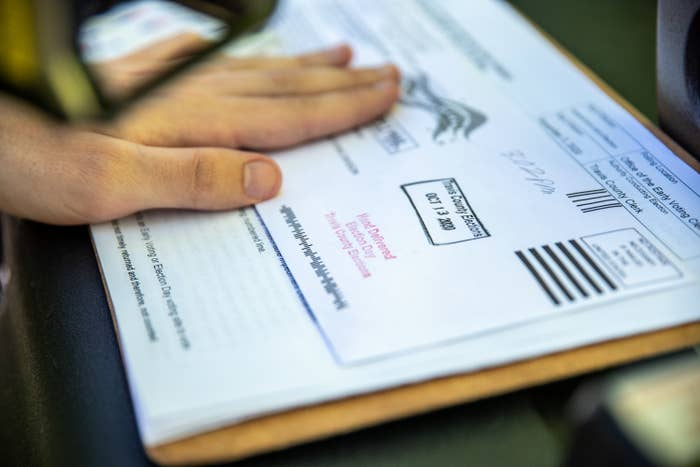
Texans who are suddenly unable to go to the polls because they contract the coronavirus shortly before Election Day will need a certified doctor’s note to vote absentee, a state appeals court ruled.
In Texas, any registered voter with a qualifying disability can request an absentee ballot simply by checking a box on a form up until 11 days before the election — this year, that deadline was Oct. 23. But if voters contract the coronavirus or become otherwise medically unable to vote after that date, they can’t self-certify that they need an absentee ballot. Instead, they need a doctor’s note with specific language stating they have “a sickness or physical condition” that prevents them from voting in person.
MOVE Texas Action Fund, the voter outreach nonprofit, had sued the state arguing the doctor’s note requirement was too burdensome, particularly for people of color and voters without health insurance. The Centers for Disease Control has encouraged employers not to require doctor’s notes for employees who contract the coronavirus, noting that many people “can recover at home without medical care” and that “healthcare provider offices and medical facilities may be extremely busy and not able to provide such documentation in a timely manner.”
A county judge issued an order earlier this month that lifted the doctor’s note rule for the Nov. 3 election, but on Oct. 23 an appeals court put it back in place. MOVE said it won’t ask the state Supreme Court to weigh in before the election. Instead, MOVE has launched an “emergency telemedicine program” to connect voters with volunteer physicians who are willing to meet virtually and digitally sign late ballot applications.
“The current rules requiring doctors’ notes for emergency ballots effectively create a pay-to-play system for voters who are struggling to vote and stay safe in the middle of a pandemic,” said Ryan Cox, senior staff attorney with the Texas Civil Rights Project.
MOVE originally challenged the requirement in an early October lawsuit against Texas’s secretary of state, Ruth Hughs. The coronavirus pandemic made the mandate too burdensome, MOVE argued, especially for voters who don’t have primary care doctors and can’t afford medical care — voters who are also disproportionately racial minorities. Texas has the highest rate of uninsured people in the country, and CDC statistics “indicate that positive COVID-19 test results are also disproportionately in communities of color,” the lawsuit said.
When MOVE filed suit in Travis County court, 96 cases of COVID-19 were being diagnosed in the area per day, meaning that more than 1,000 people in that county alone would be diagnosed with COVID-19 between the deadline and Election Day, with greater numbers statewide, the nonprofit argued. The pandemic has killed more than 16,000 Texans and infected nearly 800,000.
On October 16, a county district judge ruled that the doctor’s note mandate violated the Texas Constitution’s Equal Protection guarantee “because it places an improper disparate burden on voters who are diagnosed with COVID-19 after the deadline.” He also said it risked the health of voters and the general public, and placed “a severe burden on the right to vote” that was “likely to burden primarily low-income and uninsured voters, and minority voters, effectively requiring a pay-to-play voting procedure.” He granted a temporary injunction, blocking the state from enforcing the requirement.
Hughs appealed. Under Texas law, Hughs’ position as secretary of state overrode the temporary injunction, so MOVE had to ask the Austin-based 3rd Court of Appeals to put the injunction back in place while the appeal moved forward.
The three-judge appeals panel ruled in Hughs’ favor. The judges, two of whom are Democrats and one of whom is Republican, wrote that making last-second changes to a requirement that had been in place since 1986 “would change the longstanding requirements governing late mail-in ballots and risk voter confusion.” The appeal is still pending, but in the meantime, MOVE didn’t prove an injunction was “necessary to preserve the parties’ rights,” they wrote.
The denial came on Oct. 23 — the deadline in contention — meaning that any newly sick Texan unable to vote in person will now need a doctor’s note.
